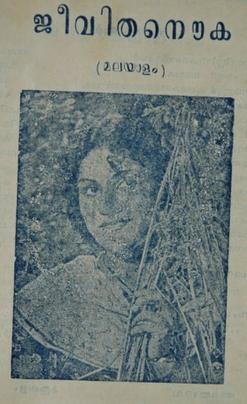Top Qs
Timeline
Chat
Perspective
Jeevitha Nouka
1951 Indian film From Wikipedia, the free encyclopedia
Remove ads
Jeevitha Nouka (transl. The Lifeboat) is a 1951 Indian Malayalam-language film directed by K. Vembu and jointly produced by K. V. Koshi and Kunchako. It was the first "blockbuster cinema" in Malayalam cinema, with a theatrical run of 284 days.[2][3] Made at a budget of ₹20,000, it was a commercial success at the box office, such that very few cinemas could surpass it later.[1] It was simultaneously shot in Tamil and Telugu, and was dubbed and released in Hindi.[4] This cinema portrayed the life of simple folk in a small village in Kerala. It stars Thikkurissy Sukumaran Nair and B. S. Saroja, with the latter making her debut and the former in his first major role.[5] Its music is composed by V. Dakshinamoorthy and popular playback singer Mehboob debuted through this cinema.[4] It is a remake of the Hindi cinema Jeevan Naiya with revised screenplay.
The Tamil version, titled Pichaikkaari (transl. The Lady Beggar), was released on 18 May 1951. Vidwan P. Adhimoolan wrote the dialogues and lyrics.[6] The song "Vanaraniye enthan manaraniye", sung by Thiruchi Loganathan and P. Leela, was popular.
Remove ads
Synopsis
The story revolves around the life of a family struggling with poverty and societal challenges. The protagonist, Raju, is a kind-hearted man who works hard to support his family. Despite his dedication, financial difficulties put immense pressure on him and his loved ones.
Raju's wife, Lakshmi, tries to maintain harmony in the household, but the arrival of wealth and materialistic ambitions disrupt their peaceful life. The plot delves into themes of greed, family values, and the conflicts that arise from differing priorities among family members.
The turning point comes when misunderstandings and disputes tear the family apart, highlighting the consequences of materialism and selfishness. The movie emphasizes the importance of unity, compassion, and selflessness as it moves toward its emotional climax and resolution.
Remove ads
Cast
Malayalam
Main cast
- Thikkurissy Sukumaran Nair as Soman
- B. S. Saroja as Lakshmi
- Adhimoolam as Kaniyan
- Pankajavalli as Janu, Raju's wife
- S. P. Pillai as Shanku, Janu's brother
- Nanukuttan as Zamindar
- Sebastian Kunjukunju Bhagavathar as Raju, Soman's elder brother
- Supporting cast
- Ponnappan Arckatty as SI of Police
- Muthukulam Raghavan Pillai, Ambalappuzha Ravunni, Baby Girija, Jagadamma, Janamma, Mathappan, Mulavana, Soman Pillai.
Tamil
- Main cast
- Thikkurissy Sukumaran Nair as Soman
- Kunju Kunju Bhagavathar as Raju
- B. S. Saroja as Lakshmi
- Pankajavalli as Janu
- Adhimoolam as Kaniyar
- Muthukulam Raghavan Pillai as Lawyer
- S. P. Pillai as Shanku
- Mathappan as Kunju
- Dance
- C. R. Rajakumari
- Indira Acharya
- B. S. Saroja
- Gopalakrishnan
- Balachandran
Remove ads
Soundtrack
Summarize
Perspective
V. Dakshinamoorthy composed the music for both Malayalam and Tamil versions. All the tunes for all the songs for both languages are the same with slight changes in playback singers.
- Malayalam songs (Jeevitha Nouka)
Lyrics were penned by Abhayadev and Vallathol Narayana Menon. Playback singers are Thiruchi Loganathan, Ghantasala, Sebastian Kunjukunju Bhagavathar, V. Dakshinamoorthy, Mehboob, P. Leela, Alappuzha Pushpam and Kaviyoor Revamma.
- Tamil songs (Pichaikkaari)
Lyrics were penned by P. Aadhimoolan.
Remove ads
Box office
This film was a critical and commercial success and ran over 284 days in theatres.[7] The film was screened in Kozhikode for 175 days and ran for 107 days in Ernakulam. 100 days have been completed in Kollam, Alappuzha, Kottayam, Kannur and Thrissur districts.[8]
References
External links
Wikiwand - on
Seamless Wikipedia browsing. On steroids.
Remove ads

